TRAINING OF TRAINER PENANGANAN ANAK DENGAN GANGGUAN SPEKTRUM AUTISME BAGI GURU SEKOLAH LUAR BIASA DAN GURU PEMBIMBING KHUSUS SEKOLAH INKLUSI SE-JAWA TIMUR
Downloads
This study aims to determine the effectiveness of training of trainers management of children with autism spectrum disorders for special school teachers and special guidance teacher for inclusive schools throughout East Java. This Training of Trainers Management of Children with Autism provides the latest information relating to the characteristics of autism symptoms comprehensively, and equips participants with strategies for managing children with autism using the TEACCH approach that has been proven empirically (evidence based) to support the development of functional behavior in children with autism. The training aimed at developing the knowledge and skills of participants in handling autism was carried out using the lecture,
role play, simulation and planning matrix making practices, playing tools and independence work system. There were 73 research subjects consisting of SLB teachers and inclusive school GPK representing 38 cities / regencies, selected from 114 participants of the Communication Skills Development Skills Training for Children with Autism throughout East Java at the end of 2017. This training was held on the 25–29 September 2018 at Pelangi Hotel, Malang. The results of data processing indicate an increase in participants' knowledge and skills after attending the training. Based on statistical tests on the evaluation of knowledge learning is known the value of t = -13.137 and the value of Sig = 0.000 (p <0.005) which can mean that
there are significant differences between participants' knowledge before and after being given training. At the behavioral evaluation level there is an increase in participants' skills in making planning matrix, playing tools and individual work systems.
Abstrak
Penelitian ini bertujuan untuk mengetahui efektifi tas training of trainer penanganan anak dengan gangguan spektrum Autisme bagi guru SLB dan GPK sekolah inklusi se-Jawa Timur. Training of Trainer Penanganan Anak dengan Autisme ini memberikan informasi terbaru berkaitan dengan karakteristik gejala Autisme secara komprehensif, serta membekali peserta dengan strategi penanganan anak dengan Autisme dengan menggunakan pendekatan TEACCH yang telah terbukti secara empiris (evidence based) dapat mendukung berkembangnya perilaku fungsional pada anak dengan Autisme. Pelatihan yang diarahkan pada pengembangan pengetahuan dan keterampilan peserta dalam penanganan Autisme ini dilaksanakan dengan metode ceramah, role play, simulasi dan praktik pembuatan planning matrix, alat bermain dan independence work system. Subjek penelitian berjumlah 73 orang yang terdiri dari guru SLB dan GPK sekolah inklusi yang mewakili 38 kota/kabupaten, yang diseleksi dari 114 peserta Bimbingan Teknik Pengembangan Kemampuan Komunikasi pada Anak dengan Autisme se-Jawa Timur pada akhir tahun 2017. Pelatihan ini dilaksanakan pada tanggal 25–29 September 2018 di Hotel Pelangi, Malang. Hasil dari pengolahan data menunjukkan adanya peningkatan pengetahuan dan keterampilan peserta setelah mengikuti pelatihan. Berdasarkan uji statistik pada evaluasi pembelajaran pengetahuan diketahui nilai t = - 13,137 dan nilai Sig = 0,000 (p < 0,005) yang dapat diartikan bahwa terdapat perbedaan yang signifi kan antara pengetahuan peserta sebelum dan setelah diberikan pelatihan. Pada level evaluasi perilaku terdapat peningkatan keterampilan peserta dalam membuat planning matrix, alat bermain dan individual work system.
American Psychiatric Association. 2013. DSM-5 Autism Spectrum Disorder Fact Sheet. Diakses pada 30 April 2014 dari http://www.dsm5.org/Documents/ Autism%20Spectrum%20Disorder%20Fact%20Sheet.pdf.
Autism Advisory Board on Autism Spectrum Disorders. 2007. The prevalence of autism in australia: Can it be established from existing data? Diakses pada 30 April 2014 dari http://autismaus.com.au/uploads/ pdfs/ PrevalenceReport.pdf.
Autism Association of Western Australia. 2012. What is autism. Diakses pada 30 April 2014 dari http://www.autism.org.au/what-is-autism/overview.aspx.
Burhani, R (Ed). 2012. Kemdikbud bangun 29 pusat layanan autis. Diakses pada 30 April 2014 dari http://www.antaranews.com/berita/34504/kemdikbud-bangun-29-pusat-layanan-autis.
Feinstein, A. 2010. A history of autism: Conversations with the pioneers. United Kingdom: Wiley- Blackwell. Hazliansyah. 2013. 112.000 anak Indonesia diperkirakan menyandang Autisme. Diakses pada 30 April 2014 dari http://www.republika.co.id/berita/ nasional/umum/13/04/09/mkz2un-112000-anak-indonesiadiperkirakan-menyandang-Autisme.
Irham, M. 2014. Sekolah inklusi berlaku diskriminatif pada penyandang autis. Diakses pada 30 April 2014 dari http://www.portalkbr.com/berita/nasional/
_4202.html.
Johnson, C.A. & Johnson, F.P. 2001. Joining Together: Group Theory and Group Skills. Boston: Allyn & Bacon Inc.
Kirkpatrick, Donald L. 2007. Evaluating Training Programs: The four levels. San Fransisco: Berret-Koehler Publisher.Inc.
Mikail, B. 2012. Sekolah inklusi belum siap menampung ABK. Diakses pada 30 April 2014 dari http://health.kompas.com/read/2012/04/15/10551282/ Sekolah.Inklusi.Belum.Siap.Menampung.ABK.
Mondy, R. Wayne. 2008. Manajemen Sumber Daya Manusia. Terjemahan. Edisi ke-sepuluh jilid I. Jakarta: Erlangga.
National Research Council (2001). Educating Children with Autism. Committee on Educational Interventions for Children with Autism. Catherine Lord and James P. McGee, eds. Division of Behavioral and Social Sciences and Education. Washington, DC: National Academy Press.
JLM by Unair is licensed under a Creative Commons Attribution-ShareAlike 4.0 International License.
1. The journal allows the author to hold the copyright of the article without restrictions.
2. The journal allows the author(s) to retain publishing rights without restrictions
3. The legal formal aspect of journal publication accessibility refers to Creative Commons Attribution Share-Alike (CC BY-SA).
4. The Creative Commons Attribution Share-Alike (CC BY-SA) license allows re-distribution and re-use of a licensed work on the conditions that the creator is appropriately credited and that any derivative work is made available under "the same, similar or a compatible license”. Other than the conditions mentioned above, the editorial board is not responsible for copyright violation.


















